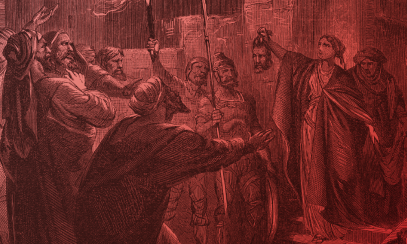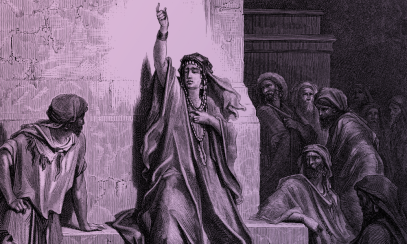
The Eighth Commandment: You Shall Not Bear False Witness Against Your Neighbor
The “eighth word” of the Decalogue continues to reveal to us how God desires us to act in our relationships with one another. Specifically, we are to never misrepresent the truth. It is a command that “flows from the vocation of the holy people to bear witness to their God who is the truth and wills the truth.”
Just as the Old Testament witnesses to God as the source of all truth, the New Testament testifies that the “whole of God’s truth has been made manifest” in Jesus Christ. In fact, Jesus Christ is the truth that came into the world to bear witness to the truth, even when it would lead to his death on the cross.
To follow Jesus, then, is to “live in ‘the Spirit of truth,’ whom the Father sends in his name and who leads ‘into all the truth.’” It means witnessing to the truth of the faith even if it means our own death. In other words, if we are to live in communion with God, who is truth, we must consent to live in the truth. That is, we must consent to be a martyr (witness) for Christ by acting upright in our actions and speech.
The Eighth Gift: You shall not bear false witness against your neighbor
Offenses against the truth
Respect for human dignity requires the “putting away of all falsehood ... all malice and all guile and insincerity and envy and all slander.” Each of these realities results in injury to our brothers and sisters – and therefore to Jesus Christ himself, who has taught us that whatever we do to others we do to him.
To this end, the Eighth Commandment forbids false witness and perjury. False witness takes on more seriousness when it is done publicly. In a court, when false witness is given under oath, it becomes perjury. These acts are offensive to God in part because they can contribute “to condemnation of the innocent, exoneration of the guilty or the increased punishment of the accused.”
In other words, they can stand in the way of that justice which is called for by all the commandments. Recall that justice is the moral virtue that “consists in the constant and firm will to give their due to God and neighbor.” In terms of one’s neighbor, justice requires respect for the rights of each person and working for harmony in human relationships so that equity with regard to persons and to the common good is promoted.
Every attitude or word that is likely to cause unjust injury to a person is forbidden out of a respect for the reputation of that person. Rushing to the rash judgment of a person without sufficient foundation, detracting from someone by disclosing that person’s faults and failings to others who do not know the person without an objectively valid reason and harming the reputation of others through calumny all fall under the prohibition of this commandment.
Detraction and calumny are especially grave because both offend not only the virtue of justice, but also the virtue of charity. Charity is the theological virtue by “which we love God above all things for his own sake, and our neighbor as ourselves for the love of God.” In other words, charity is both the new commandment and the virtue by which we keep the commandments that Christ gave us. It is the greatest of the virtues because it disposes us to participate most intimately in the life of God, who is love itself.
Detraction and calumny offend these virtues because they “destroy the reputation and honor of one’s neighbor.” This is clearly a violation of the virtue of charity. Further, because honor belongs to human dignity as its social witness, every person has the natural right to the honor of his or her name and reputation and to respect. Justice, then, requires respect for the honor of each person.
In addition, flattery, adulation and complacency are forbidden when they are placed in the service of encouraging or confirming another in “malicious acts and perverse conduct.” Boasting, bragging and irony (when aimed at disparaging another person) also are considered as offenses against the truth.
The most direct offense
The most direct offense against the truth, of course, is lying. St. Augustine said, “A lie consists in speaking a falsehood with the intention of deceiving.” It consists in either speaking or acting against the truth “in order to lead into error someone who has the right to know the truth.” When we injure a person’s relation to truth and to his or her neighbor, we offend the fundamental relation of a person and of his or her word to the Lord. Perhaps for this reason, Jesus Christ denounced lying as the work of the devil: “You belong to your father the devil … there is no truth in him. When he tells a lie, he speaks in character, because he is a liar and the father of lies.” (John 8:44)
An unconditional right?
The catechism makes it clear that the “right to the communication of the truth is not unconditional.” Fraternal love may require us to not reveal the truth to someone who asks for it in certain situations. For example, the good and safety of others, respect for privacy, the common good and the duty to avoid scandal might all be reason enough for discretion or for withholding the truth about what “ought not be known.” Further, no one “is bound to reveal the truth to someone who does not have the right to know it.” Other examples include the sacred seal of the sacrament of reconciliation, professional secrets (for example, those of officeholders, soldiers, physicians and lawyers) and even private information prejudicial to another.
– All quotes from the Catechism of the Catholic Church (2464–2492) except as otherwise noted.
The Ten Commandments Bible Geography Facts
The Jordan River is one of the world’s most sacred rivers and was the location of the baptism of Jesus Christ. With the lowest elevation of any river in the world, it rises at the Syrian-Lebanese border, flows south through northern Israel into the Sea of Galilee and eventually empties into the Dead Sea. Although the distance between its source and destination is 124 miles, the Jordan River actually covers 223 miles due to its winding course.
Characteristics of the Jordan River include: a shallowness and swiftness that make it impossible to navigate; a high degree of salinity due to thermal springs on the western side of the Sea of Galilee; and a high concentration of gypsum. Today, the river is basically used for human purposes, but the flow is diminishing due in part to the high evaporation rate of the Dead Sea and human drainage.
Did You Know?
Jordan literally means “flowing downward.”
The Ten Commandments Quiz
The story of the Israelites’ journey from slavery in Egypt to the Promised Land has a large cast of characters. Test your knowledge of biblical figures and name this person/group:
Q: “In the shadow of God,” this chief artisan of the Tabernacle was in charge of building the Ark of the Covenant.
A: Bezalel (pictured)
Doug Culp is the CAO and secretary for pastoral life for the Diocese of Lexington, Ky. He holds an MA in theology from Catholic Theological Union in Chicago.



